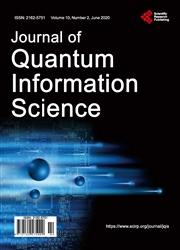G-CPT Symmetry of Quantum Emergence and Submergence—An Information Conservational Multiagent Cellular Automata Unification of CPT Symmetry and CP Violation for Equilibrium-Based Many-World Causal Analysis of Quantum Coherence and Decoherence
引用次数: 42
Abstract
An equilibrium-based YinYang bipolar dynamic Generalization of CPT (G-CPT) symmetry is introduced based on energy/information conservational quantum emergence-submergence. As a bottleneck of quantum computing, quantum decoherence or collapse has been plaguing quantum mechanics for decades. It is suggested that the crux of the problem can trace its origin back to the incompleteness of CPT symmetry due to the lack of holistic representation for equilibrium-based bipolar coexistence. In this work, the notion of quantum emergence-submergence is coined as two opposite processes with bipolar energy/information conservation. The new notion leads to G-CPT symmetry supported by a Bipolar Quantum Cellular Automata (BQCA) interpretation of quantum mechanics. It is shown that the new interpretation further leads to the unification of electromagnetic particle-antiparticle bipolarity and gravitational action-reaction bipolarity as well as CPT symmetry and CP violation into a philosophically, geometrically and logically different quantum gravity theory. On one hand, G-CPT symmetry enables a Bipolar Quantum Agent (BQA) to emerge as a bipolar quantum superposition or entanglement coupled to a globally coherent BQCA; on the other hand, G-CP violation supports a causal theory of BQA submergence or decoupling from the global coherence. In turn, BQAs can submerge from one world but emerge in another within YinYang bipolar quantum geometry. It is suggested that all logical, physical, social, biological and mental worlds are bipolar quantum entangled under G-CPT symmetry. It is contended that G-CPT symmetry constitutes an analytical paradigm of quantum mechanics and quantum gravity—a fundamental departure from “what goes around comes around”. The new paradigm leads to a number of predictions and challenges.量子涌现和湮没的G-CPT对称性——基于平衡的量子相干和退相干多世界因果分析中CPT对称性和CP违背的信息保守多agent元胞自动机统一
基于能量/信息守恒的量子涌现-淹没,提出了一种基于平衡的阴阳双极性CPT (G-CPT)对称的动态推广方法。量子退相干或坍缩作为量子计算的瓶颈,几十年来一直困扰着量子力学。认为问题的症结可以追溯到由于缺乏基于平衡的双极共存的整体表征而导致的CPT对称的不完全性。在这项工作中,量子涌现-淹没的概念被创造为具有双极性能量/信息守恒的两个相反过程。这个新概念导致了G-CPT对称,由量子力学的双极量子细胞自动机(BQCA)解释支持。结果表明,新的解释进一步将电磁粒子-反粒子双极性和引力作用-反应双极性以及CPT对称性和CP违逆统一为哲学上、几何上和逻辑上不同的量子引力理论。一方面,G-CPT对称性使双极量子代理(BQA)能够以双极量子叠加或纠缠耦合到全局相干的BQCA;另一方面,G-CP违背支持BQA淹没或从全局相干解耦的因果理论。反过来,bqa可以从一个世界中消失,但在阴阳双极量子几何中出现在另一个世界中。在G-CPT对称下,所有的逻辑、物理、社会、生物和精神世界都是双极量子纠缠。有人认为,G-CPT对称构成了量子力学和量子引力的一种分析范式——从根本上背离了“一转一转”。新的范式带来了许多预测和挑战。
本文章由计算机程序翻译,如有差异,请以英文原文为准。
求助全文
约1分钟内获得全文
求助全文

 求助内容:
求助内容: 应助结果提醒方式:
应助结果提醒方式:


